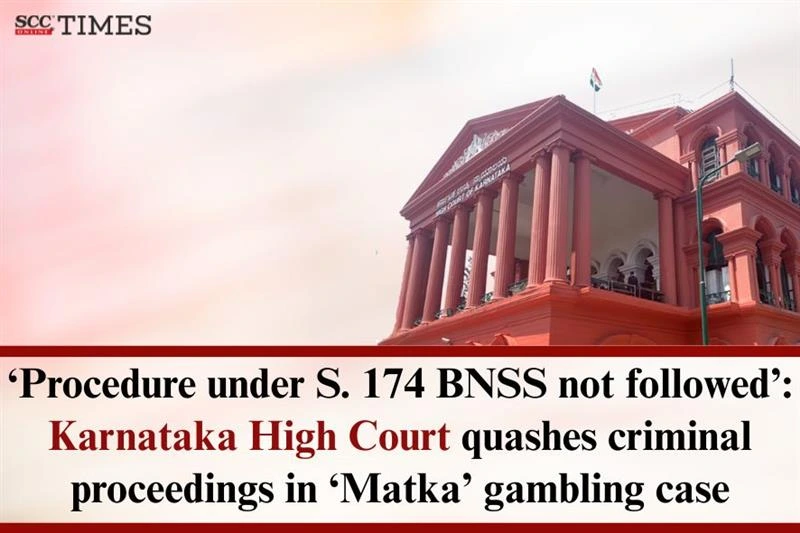Karnataka High Court: In a petition filed under Section 528 of Nagarik Suraksha Sanhita, 2023 (‘BNSS’) praying to quash the criminal proceedings in ‘Matka’ gambling case, V. Srishananda, J.* opined that the Station House Officer (‘SHO’) had not only registered the case but investigated the matter and filed the final report without following the procedure as contemplated under Section 174 of BNSS. Thus, the Court quashed the criminal proceedings in the Matka gambilng case.
Background
The Police Inspector of Hutti Police Station lodged a report with the SHO for the offence punishable under Section 78(3) of the Karnataka Police Act, 1963 (‘KP Act’). The report revealed that, the Police Inspector, received credible information that near the new bus-stand of Hutti Town, some people are playing ‘Matka’ by announcing that for a rupee invested reward will be Rs.80/- and were noting down the numbers. Based on the said information, a team of officers raided the said place and noticed that petitioners and certain other people were found indulging in ‘Matka’. Thus, the police seized a sum of money and phones which were found in the custody of the petitioners.
Thereafter, the police registered a case, investigated the matter and filed charge-sheet.
The petitioners approached the Court calling in question the registration of the said case and the filing of its charge-sheet.
Analysis, Law, and Decision
The Court analysed the provisions of Section 174 BNSS and explained its procedure as follows:
- When any information is received by an officer in-charge of the police station within whose jurisdiction a non-cognizable offence has been committed, he is bound to enter or cause to be entered the substance of the information in a book to be kept in the police station as the State Government may prescribe in the rules.
- Then the informant should be referred to the Magistrate for obtaining necessary permission.
- Section 174(2) BNSS creates an embargo on the police officer not to investigate such matters, where non-cognizable offence is made out without an order by the jurisdictional Magistrate, who has got power to try such offence or commit the case for trial.
- Jurisdictional Magistrate, based on the report/complaint may consider the contents of the complaint or report and permit the police to investigate the matter by passing an order in writing.
-
On receipt of such an order by the jurisdictional Magistrate, the police should register a case and investigate the matter as an officer in-charge of the police station, except for arresting the person involved in the said case without arrest warrant and file appropriate report as is contemplated under Section 174(3) BNSS.
The Court observed that the offence in question was a non-cognizable offence, but the SHO not only registered the case but investigated the matter and filed the final report without any such order by the jurisdictional Magistrate. Accordingly, the Court held that the criminal proceedings in the ‘Matka’ gambling case, against the petitioners were liable to be quashed, as the procedure under Section 174 of BNSS was not duly followed.
The Court observed that even though BNSS came into force on 1-7-2024, till today no rules were framed by the State. Thus, the Court stated that it is expected that State would take necessary steps in this regard at the earliest.
[Asif. v. State of Karnataka, 2025 SCC OnLine Kar 11644, decided on: 1-7-2025]
*Judgement authored by- Justice V. Srishananda
Advocates who appeared in this case:
Advocate for the Petitioners- Shivanand V. Pattanashetti, Advocate
Advocate for the Respondents- Arati Patil (HCGP)


